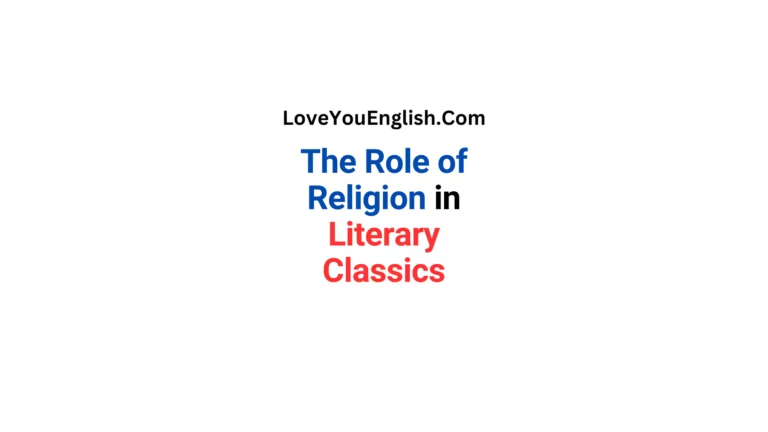English Literature’s Most Memorable Villains
Sharing is caring!
In English literature, villains play an important role in making stories interesting and exciting. They are the characters who create problems for the heroes or protagonists, making the plot more engaging. Villains are often portrayed as cruel, wicked, or selfish, but they can also be complex characters with deep motivations. Some villains are so memorable that they have become a part of popular culture, known by readers across the world.
In this post, I will take a closer look at some of the most memorable villains in English literature, exploring what makes them unforgettable.
1. Iago from Othello by William Shakespeare
Iago is one of the most famous villains in all of Shakespeare’s works. In the play Othello, Iago is the trusted ensign to Othello, the Moorish general in Venice. However, Iago feels jealous of Cassio, Othello’s lieutenant, and decides to destroy Othello’s life out of pure spite.
What makes Iago so memorable is his cunning and manipulative nature. He doesn’t directly harm people; instead, he manipulates those around him, planting seeds of doubt and jealousy. His deceitful actions lead to Othello’s tragic downfall. Iago’s villainy lies in his ability to manipulate people’s emotions and control their actions without them realizing it. His motives may seem petty—he’s driven by jealousy and resentment—but his ability to destroy lives makes him a truly dangerous character.
2. Lady Macbeth from Macbeth by William Shakespeare
Another unforgettable villain from Shakespeare is Lady Macbeth, the wife of Macbeth. In the play Macbeth, Lady Macbeth encourages her husband to murder King Duncan in order to take the throne for himself. She is ambitious and ruthless, willing to do anything to see her husband succeed, even if it means committing murder.
What makes Lady Macbeth such a powerful villain is her strength and determination. She is the one who pushes Macbeth to follow through with the murder, showing her cold and calculating nature. However, Lady Macbeth’s villainy is also complicated by her guilt. As the play progresses, she becomes mentally and emotionally disturbed by the bloodshed, revealing the complexity of her character. Her descent into madness and eventual death show that her ambition and actions come with great consequences.
3. The Wicked Queen from Snow White by The Brothers Grimm
In Snow White, the Wicked Queen is a classic fairy tale villain. She is obsessed with being the “fairest of them all” and cannot tolerate the idea of anyone being more beautiful than her. When Snow White, a young girl with stunning beauty, becomes the new target of her jealousy, the Queen decides to kill her.
The Wicked Queen’s villainy is driven by her vanity and insecurity. She is willing to go to extreme lengths, including using magic, to destroy Snow White. The Queen’s actions—such as sending Snow White into the forest with orders to kill her and later poisoning her with an apple—make her a frightening and memorable villain. Her vanity and evil deeds lead to her eventual downfall, but her jealousy and desire for power make her a character that readers will never forget.
4. Sauron from The Lord of the Rings by J.R.R. Tolkien
Sauron, the Dark Lord from J.R.R. Tolkien’s The Lord of the Rings trilogy, is another memorable villain in English literature. He is an evil being who seeks to control Middle-earth by creating the One Ring, which has the power to dominate all other beings. His goal is to rule the world and bring all creatures under his control.
Although Sauron himself doesn’t appear much in the story, his presence is felt throughout the entire series. His influence spreads fear and darkness, and his desire for power makes him a terrifying figure. Sauron represents pure evil, and his obsession with control makes him a villain that readers fear and despise. His eventual defeat in the story’s conclusion highlights the power of good over evil.
5. Professor Moriarty from Sherlock Holmes by Sir Arthur Conan Doyle
Professor Moriarty is the arch-nemesis of Sherlock Holmes, the famous detective created by Sir Arthur Conan Doyle. Moriarty is a brilliant criminal mastermind who is involved in a vast network of illegal activities. He is often referred to as the “Napoleon of crime” due to his intelligence and ability to outsmart others.
What makes Moriarty such a memorable villain is his intellect. He is not only a physical threat to Holmes but also a mental one. Moriarty and Holmes engage in a battle of wits, with Moriarty always staying one step ahead. Moriarty’s cunning and ruthlessness make him a worthy adversary to Holmes, and his role as a mastermind in the world of crime ensures that he remains a key figure in literature.
6. Ebenezer Scrooge from A Christmas Carol by Charles Dickens
Although Ebenezer Scrooge is not an outright villain in the traditional sense, he is still one of the most memorable characters in English literature. In A Christmas Carol, Scrooge is a miserly, cold-hearted old man who cares only about money and refuses to help those in need. He is cruel to his employees, including Bob Cratchit, and shows no compassion for anyone around him.
What makes Scrooge a memorable villain is the fact that he is not inherently evil but instead selfish and greedy. However, through the intervention of the three ghosts of Christmas, Scrooge undergoes a transformation, realizing the importance of kindness and generosity. His character arc—from villain to hero—makes A Christmas Carol a timeless story of redemption. Scrooge’s transformation reminds readers that even the most selfish person can change.
7. The Sheriff of Nottingham from Robin Hood by Sir Walter Scott
The Sheriff of Nottingham is the primary antagonist in the legend of Robin Hood. He is a cruel and oppressive ruler who works to stop Robin Hood and his band of Merry Men. The Sheriff is known for his greed and abuse of power, often taking money from the poor and punishing those who defy him.
What makes the Sheriff of Nottingham such a memorable villain is his complete disregard for justice and fairness. He embodies the corrupt and oppressive authority that Robin Hood fights against. The Sheriff’s constant pursuit of Robin Hood and his eventual defeat at the hands of the outlaw hero make him a figure of hate and frustration for the audience.
8. Tom Riddle (Lord Voldemort) from Harry Potter by J.K. Rowling
Lord Voldemort, also known as Tom Riddle, is the dark wizard and primary antagonist in the Harry Potter series by J.K. Rowling. He is feared by the wizarding world for his dark magic, his desire for immortality, and his quest to dominate both wizards and Muggles. Voldemort is a product of his troubled past, and his thirst for power and control over others makes him one of the most iconic villains in modern literature.
What makes Voldemort so memorable is his deep hatred for Harry Potter, whom he sees as the only person who can defeat him. His dark magic, cold-hearted nature, and obsession with purging the world of those he considers inferior make him a terrifying villain. Throughout the series, Voldemort’s influence grows, and his eventual defeat shows that good can triumph over evil.
9. Dracula from Dracula by Bram Stoker
Count Dracula, the vampire lord from Bram Stoker’s Dracula, is one of the most famous villains in Gothic literature. Dracula is a centuries-old vampire who seeks to spread his curse and control others. His main goal is to move from Transylvania to England, where he can prey on new victims and extend his power.
What makes Dracula such a memorable villain is his combination of charm and terror. He is both a charismatic figure and a bloodthirsty monster, creating a sense of fear and fascination. His ability to control the minds of others and his superhuman strength make him an intimidating figure. Dracula is often seen as a symbol of the dangers of unchecked desire and the fear of the unknown.
10. Gollum from The Lord of the Rings by J.R.R. Tolkien
Gollum, another character from The Lord of the Rings, is a tragic villain who is both pitiable and terrifying. Once a creature named Sméagol, Gollum is corrupted by the power of the One Ring, which he obsessively desires. Gollum’s split personality—alternating between the innocent Sméagol and the cruel, vengeful Gollum—makes him a complex and memorable character.
What makes Gollum such an unforgettable villain is his internal struggle. He is not entirely evil, and readers can sympathize with his desire for the Ring. However, his obsession with the Ring leads him down a dark path, making him dangerous and unpredictable. Gollum’s tragic end shows the destructive power of greed and obsession.
Conclusion
Villains in English literature are essential to creating compelling and memorable stories. Whether they are driven by jealousy, greed, power, or revenge, these characters challenge the heroes and push the plot forward. The villains we discussed—like Iago, Lady Macbeth, Sauron, and Voldemort—are not just villains because of their actions, but also because of the complex motivations and emotions that drive them. They leave a lasting impact on readers, making their stories unforgettable.
More topics:
- The Role of Humor in Shakespeare’s Comedies
- The Concept of Utopia in English Literature
- How to Approach Literary Criticism
- Women Writers in English Literature
- Epic Tales in English Literature: Beowulf & Paradise Lost
- How to Analyze a Poem: A Step-by-Step Guide for Beginners
Resources:
- Victorian Literature and Culture
http://www.victorianweb.org - Modernist Literature Resources
https://modernism.research.yale.edu - Full-Text Literary Works and Criticism
https://www.proquest.com/literatureonline
Sharing is caring!








